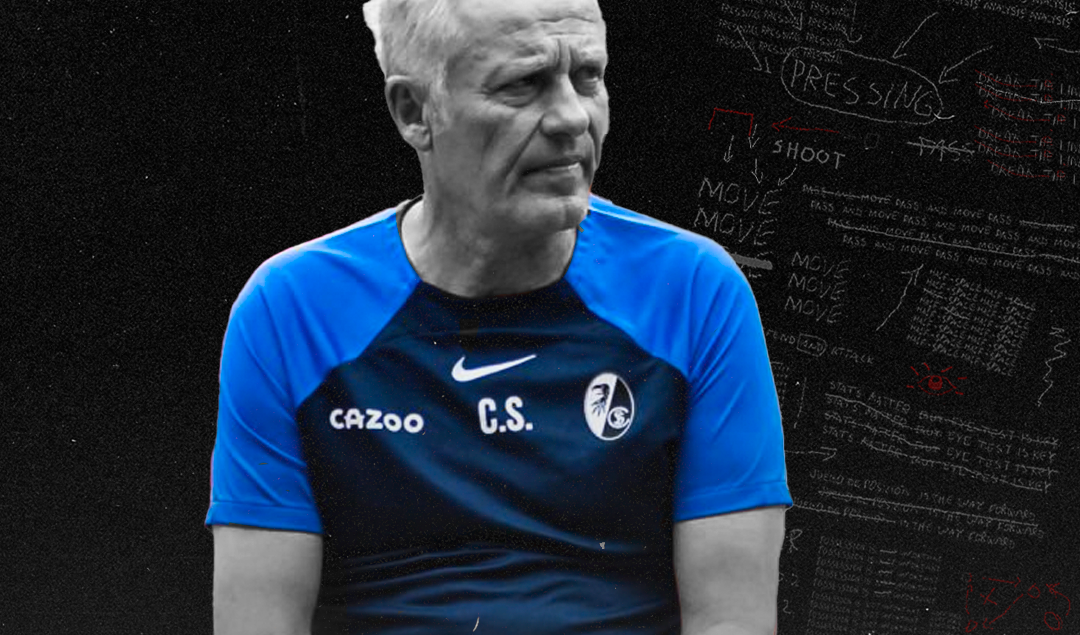Tactical Analysis: Christian Streich’s Freiburg
There’s still two months left in the 2023/24 season, but we’ve already seen various teams announce changes at the managerial position. Both of the reigning champions in Spain and Germany are on the lookout for new managers, with Xavi and Thomas Tuchel stepping down from their posts at Barcelona and Bayern Munich at the end of the campaign, whilst Jürgen Klopp’s legendary reign at Liverpool will also come to an end.
Klopp has been in charge at Anfield since October 8, 2015, a tenure that is surpassed in longevity by just three managers in Europe’s top 5 leagues: Frank Schmidt at Heidenheim (September 17, 2007), Diego Simeone at Atlético Madrid (December 23, 2011) and Christian Streich at Freiburg (December 29, 2011). Whilst Schmidt and Simeone are still going strong and look set for yet another season at the helm, Streich’s time in charge will come to an end this summer.
After a decade-long playing career, Streich immediately transitioned into coaching, returning to Freiburg in 1995. Over the next 16 years, he would hone his trade in the club’s youth ranks, winning the 2006, 2009, and 2011 junior DFB Cup and the Under 19 Fußball-Bundesliga championship in 2008, before eventually taking charge of the first team. Since then, he has overseen relegation and promotion and guided them to a DFB-Pokal Final, and he has engineered some of the most glorious moments in the club’s 120-year history.
Prior to Streich’s hiring, Freiburg had enjoyed just two stints in European football, losing to Slavia Prague in the first round of the 1995/96 UEFA Cup before falling to Feyenoord in the third round of the tournament six years later. Since then, they have made it on four occasions, exiting the Europa League group stage in 2013/14, narrowly losing to Slovenian side NK Domzale in the third round of qualifying in 2017/18.
Having previously solidified their status as a steady midtable side, the Black Forest club ascended to extraordinary heights in 2021/22, finishing sixth in the table and coming within inches of securing their first-ever major trophy, only to lose on penalties to RB Leipzig in the DFB-Pokal Final. They would bounce back in stellar fashion, occupying the Champions League spots for the majority of the campaign only to lose to RB Leipzig and Union Berlin in the final weeks of the campaign and narrowly miss out on top four.
They made it past Kaiserslautern, St. Pauli, Sandhausen and Bayern Munich only to be obliterated 5-1 by Leipzig in the DFB-Pokal semifinals, whilst they reached uncharted territory in Europe’s secondary competition, finishing ahead of Nantes, Olympiacos and Qarabağ, only to be undone by Juventus in the Europa League Round of 16. This season, however, Freiburg have taken a step back, falling to second-tier Paderborn in the second round of the cup and regressing to ninth in the Bundesliga table.
Freiburg would finish second in their Europa League group behind West Ham and ahead of Olympiacos and TSC, drawing 0-0 in the first leg of their knockout round playoff vs. Lens before heading into halftime with a 2-0 deficit. They would produce a comeback for the ages with Roland Sallai completing his brace in the 92nd minute to force an additional half-hour, whilst Michael Gregoritsch sent the Europa-Park Stadion into further jubilation with a 99th-minute winner.
Gregoritsch would come up clutch once again with an 81st-minute winner in the following round, but West Ham would stamp their authority on the second leg and run out to a 5-0 victory to book their ticket for the Europa League quarterfinals. Freiburg’s next match would see them fall to a 3-2 home defeat to Bayer Leverkusen — the sole undefeated team in Europe and West Ham’s upcoming opponent. The Breisgau-Brasilianer have lost 11 Bundesliga matches this season, more than they suffered in the entirety of 2021/22 (9) and 2022/23 (9).
The following day, Streich announced his decision to step down in a video published on the club’s website. “It’s with a heavy heart, a very heavy heart, that I share the news with you. I thought about it a long time. We talked for a long time. But I think after 29 years, now is the right time to bring in new energy, new people, new opportunities. This club is my life and I am extremely grateful for the great support and affection that I have always received. I am full of gratitude for the experience.”
It remains to be seen whether or not the 58-year-old will resume coaching following his epic spell in Baden-Württemberg, but one thing’s for sure: he has cemented his legacy as one of the Bundesliga’s finest managers over the past decade. Today, we’re taking a deep look at the tactics behind Christian Streich’s Freiburg.
Freiburg have lined up in various formations this season such as the 4-4-2 and 4-1-4-1, whilst they also utilized a back three during the start of the campaign. No matter what tactical variation they go with, Freiburg build up with three defenders. When it’s a 3-5-2, the veteran defensive midfielder Nicolas Höfler will sit in front of the defense whilst the right-sided center back — typically Kiliann Sildillia — will shift across and act as a right back in possession.
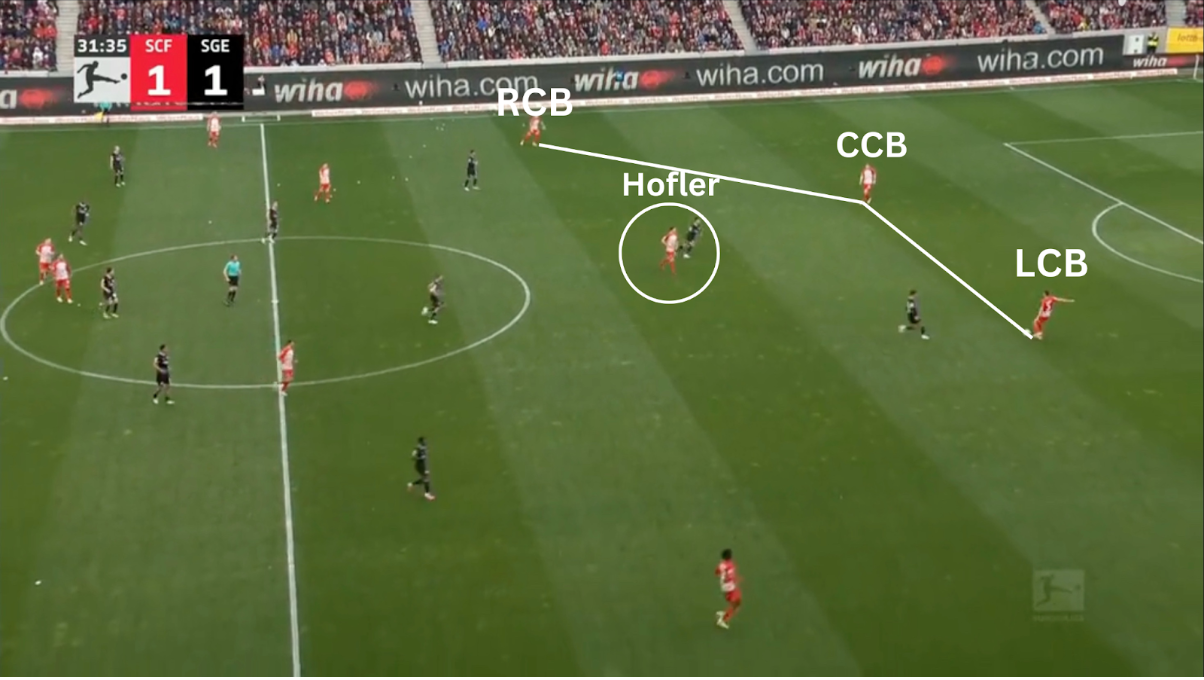
By having the right-sided center back shift over to the right back position, Ritsu Doan can stay up high instead of having to drop deep to receive the ball, which in turn allows the attack to progress the ball up the pitch with quicker speed. In a back four, however, Höfler will drop into the middle center back spot whilst the right-sided center back will shift over to recreate the desired shape.
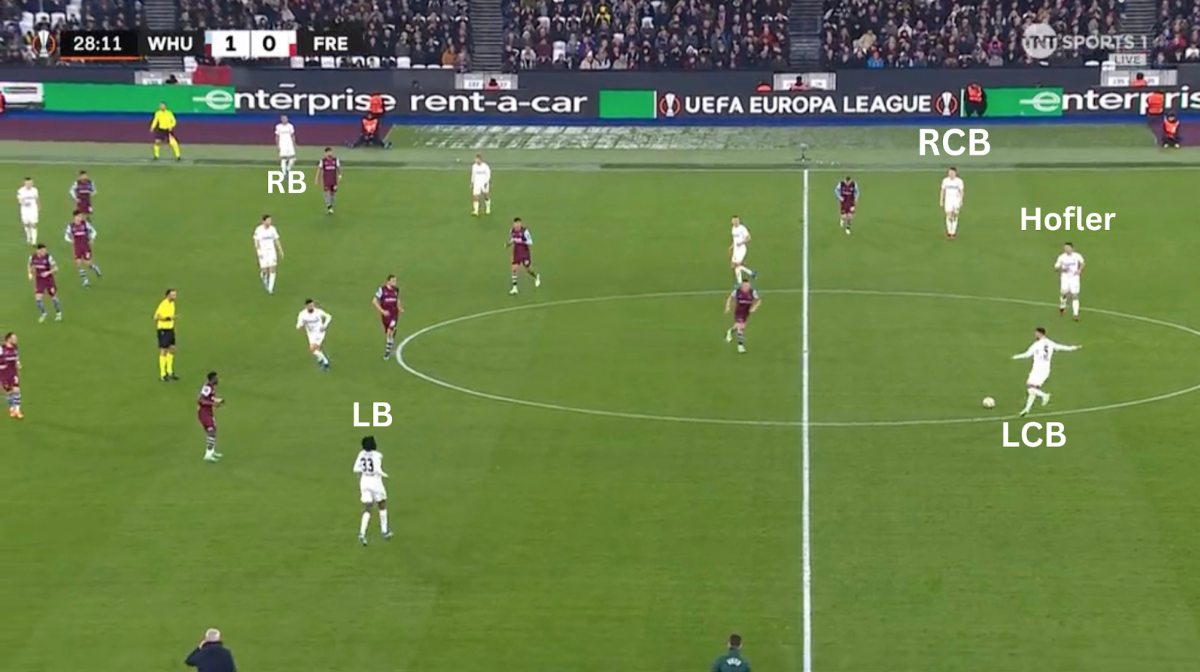
As opposed to various possession-heavy teams like Pep Guardiola’s Manchester City, Freiburg don’t try to rotate possession endlessly and patiently build up from the back — instead, they’re keen to take risks and play the long ball towards the strikers or the advanced fullbacks, and they can also work their way up the pitch with quick passing combinations. It should come as no surprise that Freiburg sit 13th in the Bundesliga for average possession (45.6%).
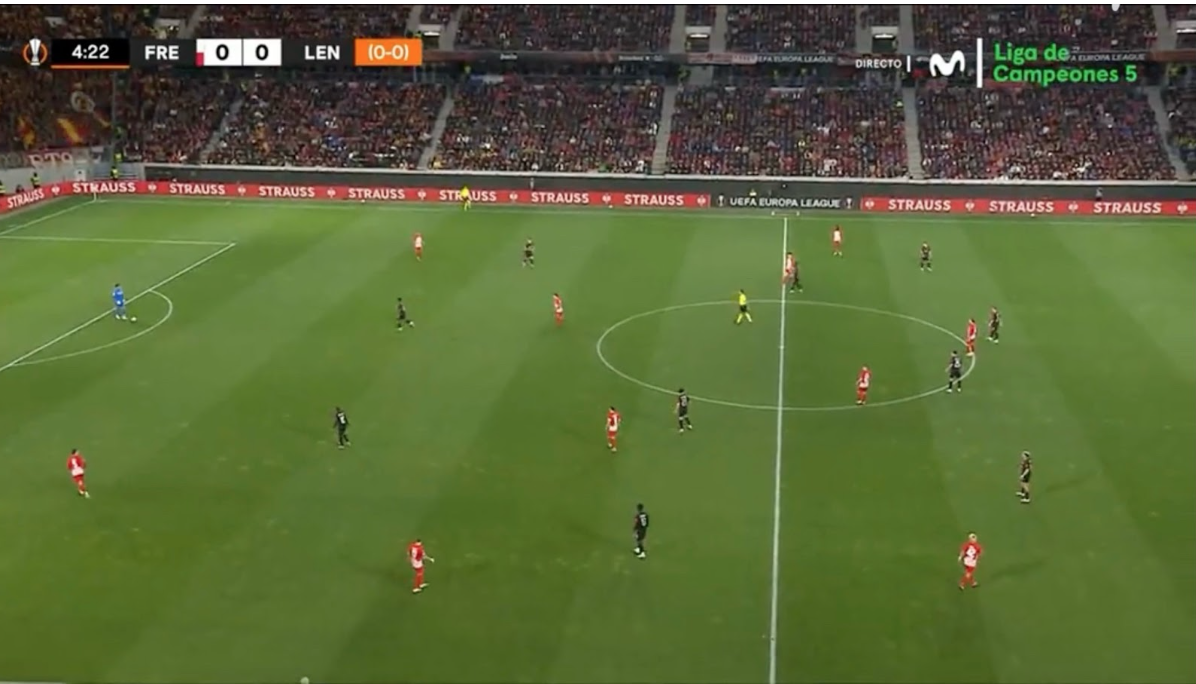
Freiburg goalkeeper Noah Atubolu will often involved himself in the build-up play, taking his time to pick a pass and slowing down the pace to enable the outfield players to settle into their in-possession shape. In this match against Lens, Freiburg played with a fullback at the center back position which resulted in Atubolu staying behind and creating a back three in possession. As such, they were able to attain their desired shape in the first phase of build-up without having to sacrifice a midfielder.
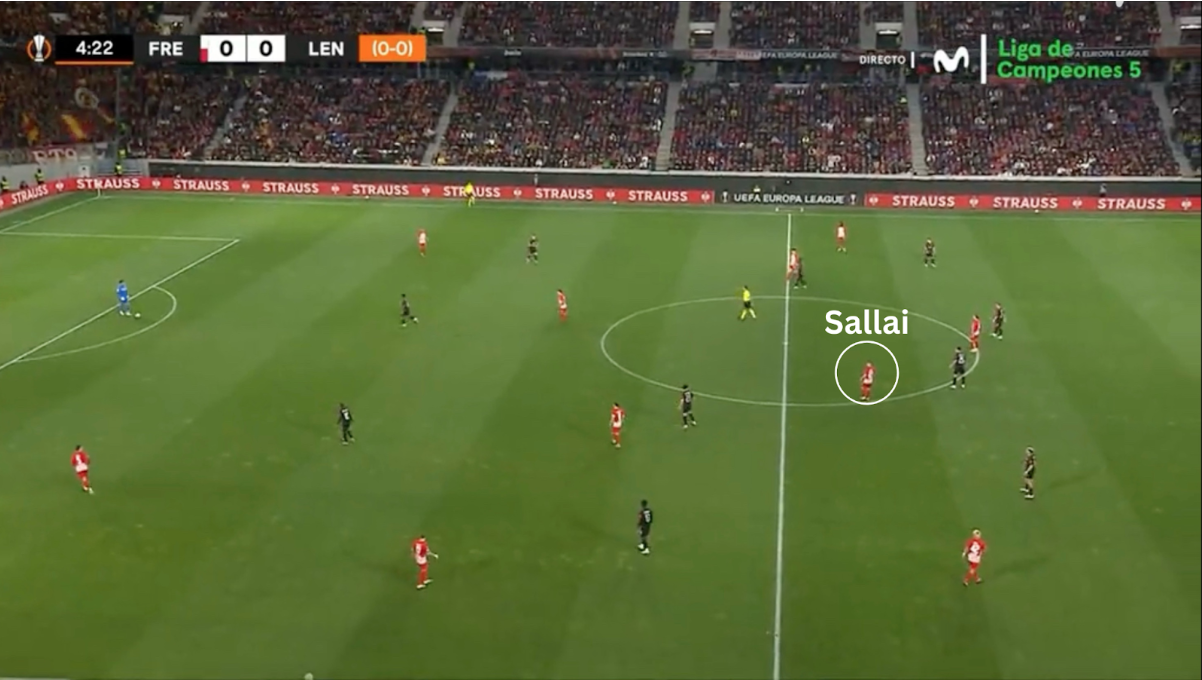
Here, Sallai is sitting somewhat deeper than Lucas Höler. The Hungarian striker will often drop into midfield to facilitate a passing option or switch the play to the flanks. He keeps the defenders guessing with his movement, drifting into different spaces to help his team build out from the back.
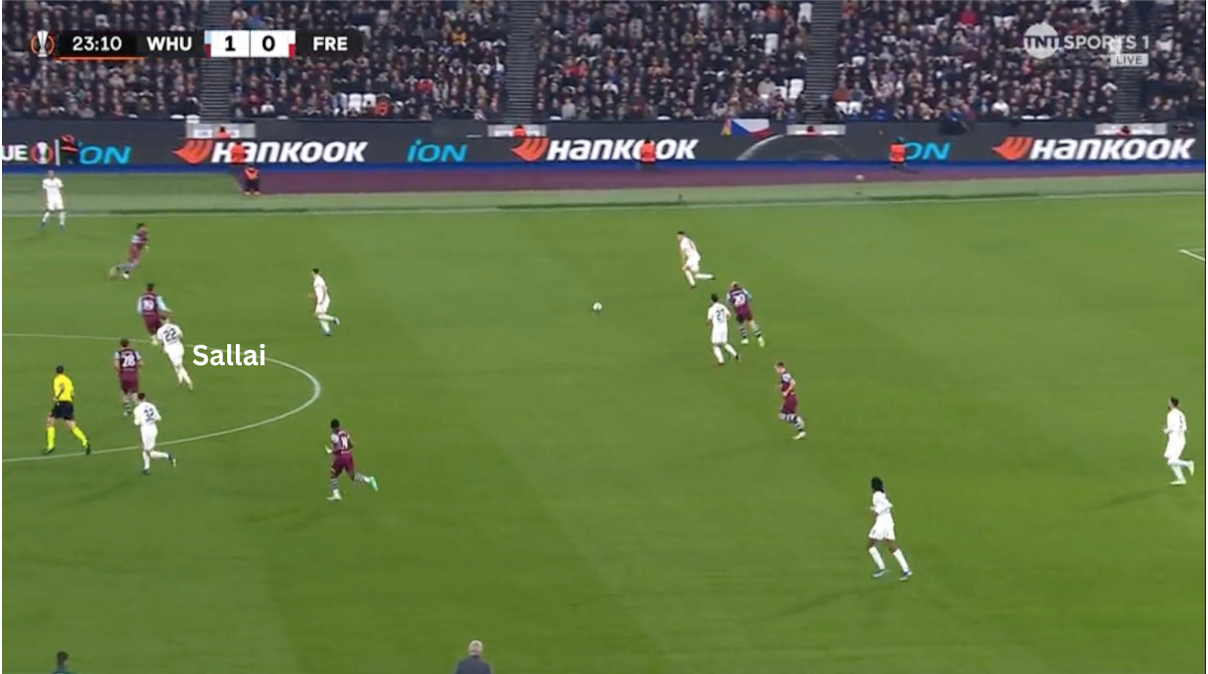
Freiburg often progress the ball through one of the midfielders – most often this is Höfler – or they go through their wide players who will create one-twos and passing triangles with the midfielders. They do this in a 3-1-4-2 or a 3-2-4-1 or even a 3-1-5-1 shape, in which Vincenzo Grifo moves inside and Jordy Makengo acts as the left-winger. Sallai plays in between the forward and midfield line, and Maximilian Eggestein is the midfielder who most often joins the attack.
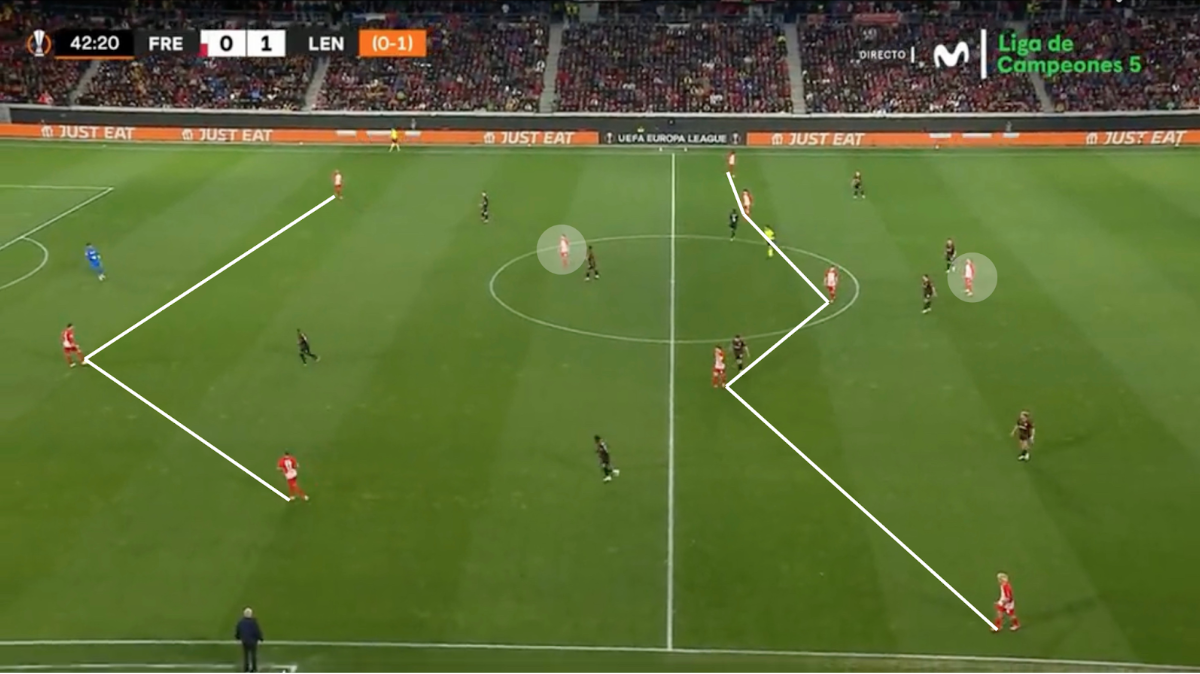
The above image demonstrates Freiburg 3-1-5-1 shape, with Sallai just behind Höler and Eggestein sitting quite high in attack, whilst the below visual demonstrates a 3-2-4-1 with two midfielders next to each other. Grifo will drift inside whilst Makengo pushes out on the wing, Höler will act as the main target man and challenge for the long ball, whilst Sallai will try to overlap and latch onto the second ball.
Freiburg will attack with up to seven players and can easily outnumber the opposing defense, forcing their midfielders to drop deep and defend against the transition. Defensively, they will press aggressively after losing the ball, but if they cannot win it back immediately, they will drop off and attempt to soak up the pressure.
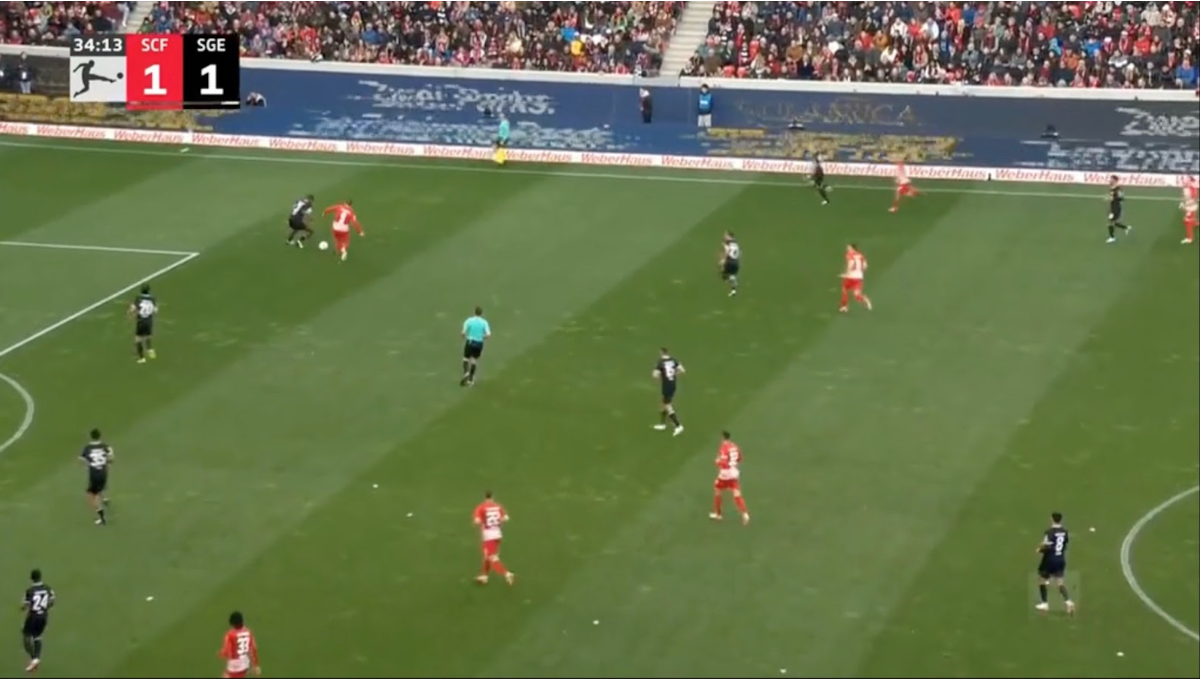
Their out-of-possession strategy in the 4-4-2 is rather straightforward with two strikers and four midfielders helping to limit the opposing attack, but it is also worth noting that Sallai will often push forward and press the opposing build-up, thus turning it into a 4-5-1. Whether it’s a back three or a back four, both systems will see the Freiburg defenders push forward interchangeably, and like clockwork, a midfielder will drop deep to fill the gap.
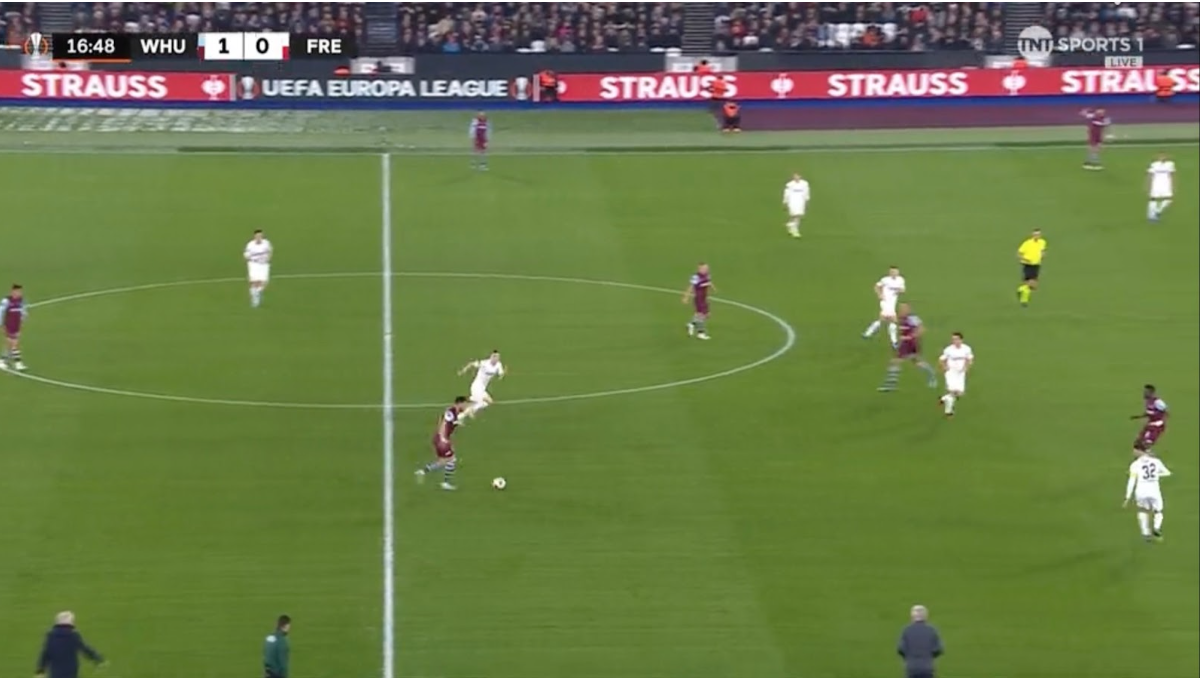
Their three-man set-up turns into a 5-3-2 with Doan playing as the right wing-back whilst Makengo — wingback by nature in contrast to Doan — will drop deep from the left, thus turning it into a five-man backline. However, in this case, Doan has the liberty to push forward and press the opponent, which will trigger a midfielder to drop deep. In some cases, Freiburg will revert to a four-man backline, but Doan will quickly drop deep to retain the shape and prevent a mismatch for his defender.
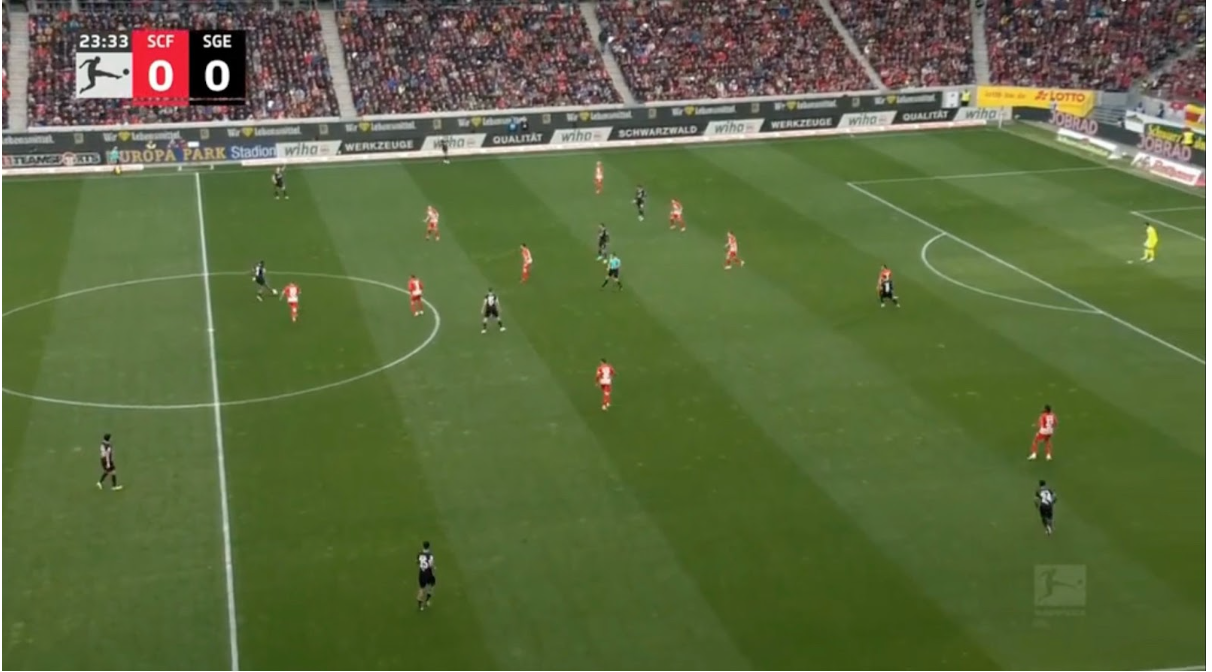
Freiburg returned from international break with a 3-0 victory at Gladbach with Gregoritsch opening the scoring within seven minutes, whilst Merlin Röhl and Doan added to their advantage after the restart. However, with just seven matches remaining, they face an uphill battle as they look to secure European qualification for a third straight season. They sit seventh in the Bundesliga, six points above Werder Bremen, three points above Hoffenheim, one above Augsburg (who have a game in hand), and five behind sixth-placed Eintracht Frankfurt.
Whilst sixth place guarantees qualification to the Europa Conference League playoff round, seventh place will qualify for the Europa Conference League playoffs provided that the winner of the DFB-Pokal is already in the top six. In other words, they need to shaky off their rusty form and get back into the top seven, and they need to hope that Bayer Leverkusen win the DFB-Pokal as opposed to third-tier Saarbrücken or second-tier Kaiserslautern or Fortuna Düsseldorf.
It remains to be seen whether or not Christian Streich will ride off into the sunset with a third straight European qualification, but one thing’s for sure: he will go down one of the greatest managers in the club’s 120-year history. Despite losing various key players like Kevin Schade, Mark Flekken, Nico Schlotterbeck, Baptiste Santamaria and Luca Waldschmidt in recent years, Streich has managed to establish Freiburg as a regular challenger for European football since earning promotion to the Bundesliga in 2016.
He has overseen their move from the 24,000-capacity Dreisamstadion, which served as their stadium from 1954 to 2021, to the 34,700-capacity Europa-Park Stadion, and he has led Freiburg to unprecedented heights in domestic and international competitions. Combined with his one year as a midfielder during the 1987/88 season in Germany’s second tier, he has spent over half of his entire life as an employee of Sport-Club Freiburg e.V. And when he does finally depart the Black Forest club in May, he will do so as a legend of not just Freiburg, but of German football as well.
By: Teo Slehofer / @TeoSlehofer
Featured Image: @Juanffran / Getty Images
